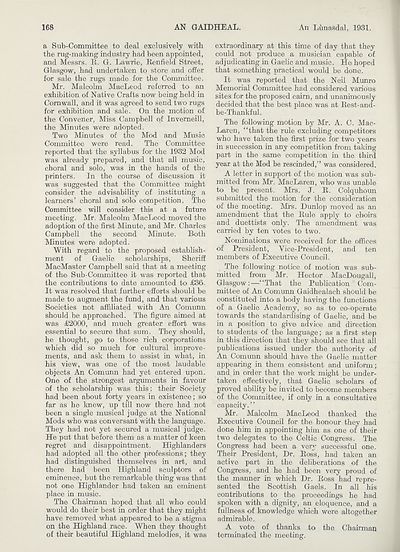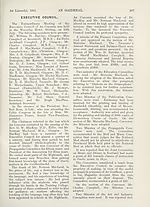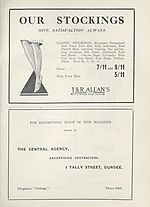An Comunn Gàidhealach Publications > Gaidheal > Volume 26, October 1930--September 1931
(216) Page 168
Download files
Complete book:
Individual page:
Thumbnail gallery: Grid view | List view

AN GAIDHEAL.
An Lunasdal, 1931.
a Sub-Committee to deal exclusively with
the rug-making industry had been appointed,
and Messrs. R. G. Lawrie, Renfield Street,
Glasgow, had undertaken to store and offer
for sale the rugs made for the Committee.
Mr. Malcolm MacLeod referred to an
exhibition of Native Crafts now being held in
Cornwall, and it was agreed to send two rugs
for exhibition and sale. On the motion of
the Convener, Miss Campbell of Invemeill,
the Minutes were adopted.
Two Minutes of the Mod and Music
Committee were read. The Committee
reported that the syllabus for the 1932 Mod
was already prepared, and that all music,
choral and solo, was in the hands of the
printers. In the course of discussion it
was suggested that the Committee might
consider the advisability of instituting a
learners’ choral and solo competition. The
Committee will consider this at a future
meeting. Mr. Malcolm MacLeod moved the
adoption of the first Minute, and Mi*. Charles
Campbell the second Minute. Both
Minutes were adopted.
With regard to the proposed establish¬
ment of Gaelic scholarships, Sheriff
MacMaster Campbell said that at a meeting
of the Sub-Committee it was reported that
the contributions to date amounted to £36.
It was resolved that further efforts should be
made to augment the fund, and that various
Societies not affiliated with An Comunn
should be approached. The figure aimed at
was £2000, and much greater effort was
essential to secure that sum. They should,
he thought, go to those rich corporations
which did so much for cultural improve¬
ments, and ask them to assist in what, in
his view, was one of the most laudable
objects An Comunn had yet entered upon.
One of the strongest arguments in favour
of the scholarship was this: their Society
had been about forty years in existence; so
far as he knew, up till now there had not
been a single musical judge at the National
Mods who was conversant with the language.
They had not yet secured a musical judge.
He put that before them1 as a matter of keen
regret and disappointment. Highlanders
had adopted all the other professions; they
had distinguished themselves in art, and
there had been Highland sculptors of
eminence, but the remarkable thing was that
not one Highlander had taken an eminent
place in music.
The Chairman hoped that all who could
would do their best in order that they might
have removed what appeared to be a stigma
on the Highland race. When they thought
of their beautiful Highland melodies, it was
extraordinary at this time of day that they
could not produce a musician capable of
adjudicating in Gaelic and music. He hoped
that something practical would be done.
It was reported that the Neil Munro
Memorial Committee had considered various
sites for the proposed cairn, and unanimously
decided that the best place was at Rest-and-
be-Thankful.
The following motion by Mr. A. C. Mac-
Laren, “that the rule excluding competitors
who have taken the first prize for two years
in succession in any competition from taking
part in the same competition in the third
year at the Mod be rescinded,” was considered.
A letter in support of the motion was sub¬
mitted from Mr. MacLaren, who was unable
to be present. Mrs. J. R. Colquhoun
submitted the motion for the consideration
of the meeting. Mrs. Dunlop moved as an
amendment that the Rule apply to choirs
and duettists only. The amendment was
carried by ten votes to two.
Nominations were received for the offices
of President, Vice-President, and ten
members of Executive Council.
The following notice of motion was sub¬
mitted from Mr. Hector MacDougall,
Glasgow:—“That the Publication Com¬
mittee of An Comunn Gaidhealach should be
constituted into a body having the functions
of a Gaelic Academy, so as to co-operate
towards the standardising of Gaelic, and be
in a position to give advice and direction
to students of the language; as a first step
in this direction that they should see that all
publications issued under the authority of
An Comunn should have the Gaelic matter
appearing in them consistent and uniform;
and in order that the work might be under¬
taken effectively, that Gaelic scholars of
proved ability be invited to become members
of the Committee, if only in a consultative
capacity. ’ ’
Mr. Malcolm MacLeod thanked the
Executive Council for the honour they had
done him in appointing him as one of their
two delegates to the Celtic Congress. The
Congress had been a very successful one.
Their President, Dr. Ross, had taken an
active part in the deliberations of the
Congress, and he had been very proud of
the manner in which Dr. Ross had repre¬
sented the Scottish Gaels. In all his
contributions to the proceedings he had
spoken with a dignity, an eloquence, and a
fullness of knowledge which were altogether
admirable.
A vote of thanks to the Chairman
terminated the meeting.
An Lunasdal, 1931.
a Sub-Committee to deal exclusively with
the rug-making industry had been appointed,
and Messrs. R. G. Lawrie, Renfield Street,
Glasgow, had undertaken to store and offer
for sale the rugs made for the Committee.
Mr. Malcolm MacLeod referred to an
exhibition of Native Crafts now being held in
Cornwall, and it was agreed to send two rugs
for exhibition and sale. On the motion of
the Convener, Miss Campbell of Invemeill,
the Minutes were adopted.
Two Minutes of the Mod and Music
Committee were read. The Committee
reported that the syllabus for the 1932 Mod
was already prepared, and that all music,
choral and solo, was in the hands of the
printers. In the course of discussion it
was suggested that the Committee might
consider the advisability of instituting a
learners’ choral and solo competition. The
Committee will consider this at a future
meeting. Mr. Malcolm MacLeod moved the
adoption of the first Minute, and Mi*. Charles
Campbell the second Minute. Both
Minutes were adopted.
With regard to the proposed establish¬
ment of Gaelic scholarships, Sheriff
MacMaster Campbell said that at a meeting
of the Sub-Committee it was reported that
the contributions to date amounted to £36.
It was resolved that further efforts should be
made to augment the fund, and that various
Societies not affiliated with An Comunn
should be approached. The figure aimed at
was £2000, and much greater effort was
essential to secure that sum. They should,
he thought, go to those rich corporations
which did so much for cultural improve¬
ments, and ask them to assist in what, in
his view, was one of the most laudable
objects An Comunn had yet entered upon.
One of the strongest arguments in favour
of the scholarship was this: their Society
had been about forty years in existence; so
far as he knew, up till now there had not
been a single musical judge at the National
Mods who was conversant with the language.
They had not yet secured a musical judge.
He put that before them1 as a matter of keen
regret and disappointment. Highlanders
had adopted all the other professions; they
had distinguished themselves in art, and
there had been Highland sculptors of
eminence, but the remarkable thing was that
not one Highlander had taken an eminent
place in music.
The Chairman hoped that all who could
would do their best in order that they might
have removed what appeared to be a stigma
on the Highland race. When they thought
of their beautiful Highland melodies, it was
extraordinary at this time of day that they
could not produce a musician capable of
adjudicating in Gaelic and music. He hoped
that something practical would be done.
It was reported that the Neil Munro
Memorial Committee had considered various
sites for the proposed cairn, and unanimously
decided that the best place was at Rest-and-
be-Thankful.
The following motion by Mr. A. C. Mac-
Laren, “that the rule excluding competitors
who have taken the first prize for two years
in succession in any competition from taking
part in the same competition in the third
year at the Mod be rescinded,” was considered.
A letter in support of the motion was sub¬
mitted from Mr. MacLaren, who was unable
to be present. Mrs. J. R. Colquhoun
submitted the motion for the consideration
of the meeting. Mrs. Dunlop moved as an
amendment that the Rule apply to choirs
and duettists only. The amendment was
carried by ten votes to two.
Nominations were received for the offices
of President, Vice-President, and ten
members of Executive Council.
The following notice of motion was sub¬
mitted from Mr. Hector MacDougall,
Glasgow:—“That the Publication Com¬
mittee of An Comunn Gaidhealach should be
constituted into a body having the functions
of a Gaelic Academy, so as to co-operate
towards the standardising of Gaelic, and be
in a position to give advice and direction
to students of the language; as a first step
in this direction that they should see that all
publications issued under the authority of
An Comunn should have the Gaelic matter
appearing in them consistent and uniform;
and in order that the work might be under¬
taken effectively, that Gaelic scholars of
proved ability be invited to become members
of the Committee, if only in a consultative
capacity. ’ ’
Mr. Malcolm MacLeod thanked the
Executive Council for the honour they had
done him in appointing him as one of their
two delegates to the Celtic Congress. The
Congress had been a very successful one.
Their President, Dr. Ross, had taken an
active part in the deliberations of the
Congress, and he had been very proud of
the manner in which Dr. Ross had repre¬
sented the Scottish Gaels. In all his
contributions to the proceedings he had
spoken with a dignity, an eloquence, and a
fullness of knowledge which were altogether
admirable.
A vote of thanks to the Chairman
terminated the meeting.
Set display mode to:
![]() Universal Viewer |
Universal Viewer | ![]() Mirador |
Large image | Transcription
Mirador |
Large image | Transcription
| An Comunn Gàidhealach > An Comunn Gàidhealach Publications > Gaidheal > Volume 26, October 1930--September 1931 > (216) Page 168 |
|---|
| Permanent URL | https://digital.nls.uk/125154996 |
|---|
| Description | This contains items published by An Comunn, which are not specifically Mòd-related. It includes journals, annual reports and corporate documents, policy statements, educational resources and published plays and literature. It is arranged alphabetically by title. |
|---|
| Description | A collection of over 400 items published by An Comunn Gàidhealach, the organisation which promotes Gaelic language and culture and organises the Royal National Mòd. Dating from 1891 up to the present day, the collection includes journals and newspapers, annual reports, educational materials, national Mòd programmes, published Mòd literature and music. |
|---|---|
| Additional NLS resources: |
|

